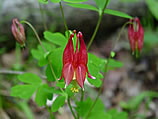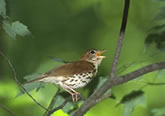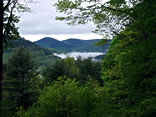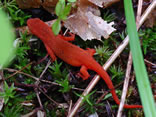
Nature Journal
| |
|
| Saturday, June 7, 2003 | |
 The
Wild Columbine has been blooming for the past week or more. The White
Baneberry, Golden Alexanders, and Common Buttercup are also blooming. The
Wild Columbine has been blooming for the past week or more. The White
Baneberry, Golden Alexanders, and Common Buttercup are also blooming.The blossoms of an early aster, which I think might be the Purple- |
|
| Thursday, June 5, 2003 | |
|
Now
that the weather is warming up, I've been seeing more butterflies.
The ones I've observed most frequently have been the Mourning
Cloak and the Eastern
Tiger Swallowtail. |
|
| Tuesday, June 3, 2003 | |
 Every
morning, I'm still hearing a wonderful symphony of bird songs: many
different species of warblers, the wood
thrush (photo at right), the ever-present robins,
the black-capped chickadee,
the phoebe, and many others. Every
morning, I'm still hearing a wonderful symphony of bird songs: many
different species of warblers, the wood
thrush (photo at right), the ever-present robins,
the black-capped chickadee,
the phoebe, and many others. |
|
It's as if every bird gets its own chance to sing a solo. |
|
| Sunday, June 1, 2003 | |
| The
June bugs, also known as May beetles or June beetles, have been flying
for the past week or so. I recall one evening last summer when I heard some unusual rustling sounds in the leaves. The sounds were coming from all around me. I couldn't imagine what was causing this noise. I got a flashlight and went back to investigate. It took quite a while to catch sight of one, but when I did, it turned out to be a June bug. These insects spend the day buried a couple of inches below the surface of the soil. At dusk, they come back up to the surface and begin feeding. |
|
| Friday, May 30, 2003 | |
|
This amphibian begins in a larval |
|
and then transforms into the final adult aquatic form. The adult is olive-green or greenish-brown. |
|
| Wednesday, May 28, 2003 | |
| After
not seeing any deer for the past
week or more, I saw my "local" doe and her daughter yesterday
and again today. They're still in the process of molting into their
summer coats. The whitetail's summer coat doesn't have the underfur that its winter coat does. This lighter coat helps to dissipate excess body heat during the warmer weather. |
|
| Monday, May 26, 2003 | |
 We
had a rainy day today. The rain has tapered off now and the view of
the mountains is pretty with a blanket of fog in the valley. We
had a rainy day today. The rain has tapered off now and the view of
the mountains is pretty with a blanket of fog in the valley.You can see that the oak leaves have not fully opened yet. The tree framing the upper portion of the |
|
| Top of page |
|
|
| Birds | Butterflies | Mammals |
| Garden Shop |
New England:
Connecticut, Maine, Massachusetts, New Hampshire, Rhode Island, Vermont
